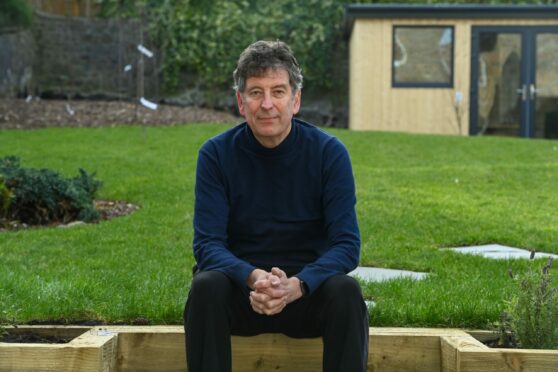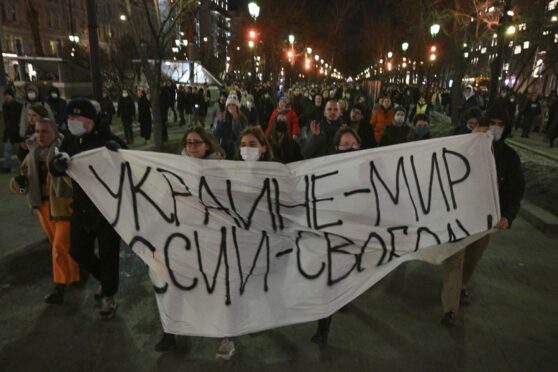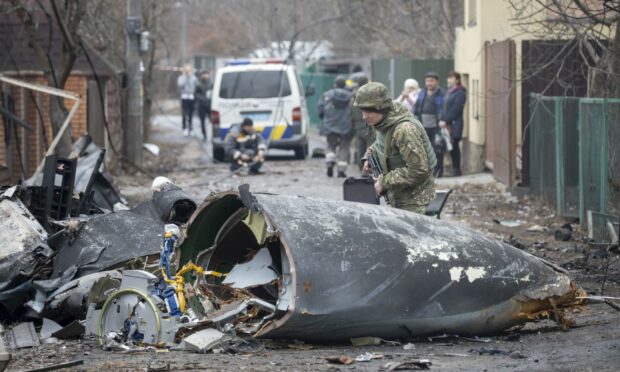A historian has described the ongoing situation in Ukraine as a “an unnecessary tragedy”.
Professor Robert Frost, the director of the Polish-Lithuanian Centre at Aberdeen University, said it was clear Putin has been “meticulously” planning his invasion of Ukraine for some time while wilfully misleading the West.
Dismissing Putin’s “19th century Russian Imperialist” view that Ukraine was created by Lenin, he argued the country has had a separate identity from as far back as the 12th century.
As part of the Grand Duchy of Lithuania, Ukraine fought against the Grand Duchy of Muscovy’s claim to all lands in Rus, maintaining they would not be ruled from Moscow even in the 15th century.
Prof Frost said: “Ukraine has forged its own identity and fought for it.
“In the 19th century, in the 1870s, they tried to ban the Ukrainian language and said it was a dialect of Russian so wouldn’t teach it in schools. Putin is entirely consistent with right-wing xenophobic Russian nationalists who just claim Ukraine is naturally part of Russia.
“It’s historically illiterate.
“What’s happening now is a complete tragedy, and it’s an unnecessary tragedy.
“It’s like if the English told the Irish ‘well, you’re really English. You speak English therefore you must be English and we’re not going to allow you to have a national identity.
“It is against everything on which European and international law has been predicated since the First World War when (US president) Woodrow Wilson declared self-determination as a principle. A nation should determine its own statehood, its own future.”
‘Many Russians are deeply opposed to this’
Since the fall of Communism, Prof Frost said Ukraine has continued to assert its independence – and he believes Putin’s actions over the last decade has actually strengthened that.
The Polish-Lithuanian Research Centre director added: “Some of us think he’s on the edge of insanity but it’s encouraging, very encouraging that there have been demonstrations against the war in over 50 Russian cities including Moscow.
“There are many, many Russians deeply opposed to this and are as appalled as we are but they are repressed, they have no voice.
“This is not a war between the Russian people and the Ukrainian people. Much of the time most of them have lived in harmony.”
However the professor acknowledged that there Putin’s regime does have its staunch followers, who believe the extreme nationalist views he expresses.
In 2015, Prof Frost was in Poland watching Russian TV and admitted he been “chilled” to hear the “war mongering” messages that projected Russia as under threat from the West.
Russia ‘knows what buttons to press’
But again, looking back at history he said: “Many people parrot this Russian line that we have to understand their point of view. ‘Russia was invaded, look at Napoleon in 1812, look at Hitler in 1941.’
“What they don’t say it ‘well look at Stalin in 1939, destroying an independent Poland, look at the Russian partitions of Poland and Lithuania, look at all the aggressive attacks on their neighbours’.
“The Russian Empire was far more aggressive towards its neighbours than any of its neighbours were towards Russia yet this myth is constructed that Russia is a victim of foreign aggression.
“Russia has been, for centuries, manipulating the institutions of free consensual societies. Exploiting those freedoms that they deny to their own people.
“They’ve been doing it to the West for decades. They know what buttons to press.”
‘Ukrainians are patriots, they will fight’
Prof Frost believes Putin will create a puppet regime by destroying Kyiv, its institutions and its government so he can install his own before then withdrawing and offering peace.
“Because we don’t want war, the governments will probably agree to it, he said.
“I don’t think Putin wants to control the whole of Ukraine and occupy it, he wants to install a puppet regime next to Donbas and let it dance to his tune.
“But I suspect he knows the Ukrainians are patriots, and they will fight and it will be very, very bloody and it will be very, very nasty.”
The professor claimed Putin is not interested in “playing by the rules” and suggested that West’s hands are tied as Russia is embedded in so many institutions, such as the United Nations and UEFA – which has today moved the final of the Champions League final to Paris as a result of the invasion.
“What they should be saying is ‘throw Russia out of the competition, we’re not going to play them at all,” he suggested. “But they won’t because Russia puts money into it.”
Putin is ‘not a man to do business with’
Being a nuclear power, and a large gas provider, Prof Frost acknowledges there is much for authorities to consider.
“The only hope is that Russia’s economy is not in a state to sustain a long war,” he said.
“The only vaguely good thing about all this is that people have realised what the man is.
“It took time in the 1930s before many people realised just what Hitler was. It’s taken a much longer time to realise just what Putin was. There have been people in the intelligence community who have been warning about it for some time, but the politicians have not really wanted to hear the message.
“Margaret Thatcher said famously of (Soviet Union leader) Mikhail Gorbachev ‘this is a man with whom we can do business’. Well, Putin is not a man with whom you can do business.”


